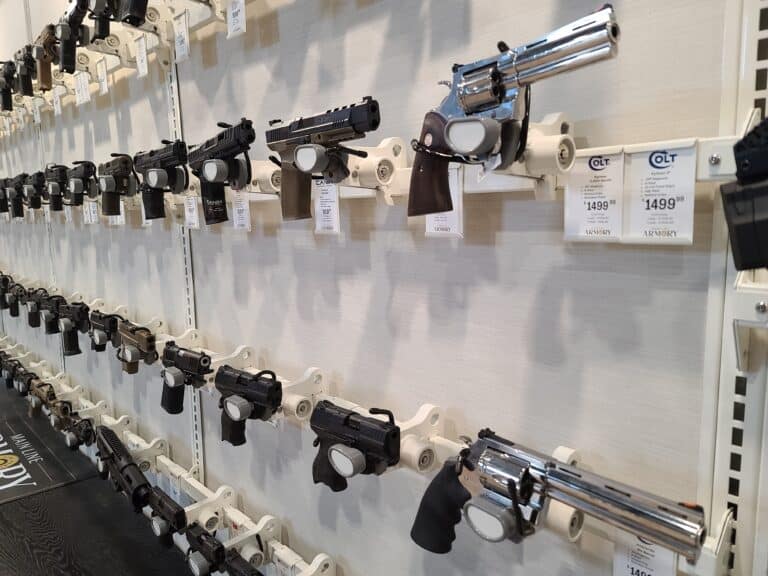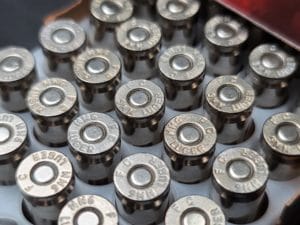Being an unlawful user of a controlled substance does not remove a person’s Second Amendment rights, a federal trial court ruled last Friday.
U.S. District Judge Kathleen Cardone, a George W. Bush appointee, dismissed a case against an El Paso woman who was charged with possessing a firearm as an unlawful user of marijuana and with transferring a firearm and ammunition to her husband, himself an illegal user of multiple controlled substances. Judge Cardone ruled that the federal prohibitions regulating both charges “deviate from our Nation’s history of firearm regulation” and are “unconstitutional.”
“In short, the historical tradition of disarming ‘unlawful’ individuals appears to mainly involve disarming those convicted of serious crimes after they have been afforded criminal process,” Judge Cardone wrote in her opinion. “Section 922(g)(3), in contrast, disarms those who engage in criminal conduct that would give rise to misdemeanor charges, without affording them the procedural protections enshrined in our criminal justice system.”
“Moreover, § 922(d)(3) does not tie its restrictions on gun use to intoxication or public safety in the way that historical gun regulations did,” she added. “Nor does it provide the pre-deprivation process that laws disarming dangerous individuals historically required. In sum, § 922(d)(3) does not withstand Second Amendment scrutiny for much the same reasons that § 922(g)(3) does not.”
The ruling is the second federal court decision in as many months to strike down the federal government’s longstanding ban on gun possession by marijuana users. An Oklahoma federal judge also struck down the weed and gun ban during a criminal case in early February. That case is currently awaiting appeal in the Tenth Circuit.
It’s also the latest in a string of lower court rulings whittling away at the legality of federal criteria for who may be prohibited from purchasing or possessing firearms following the Supreme Court’s decision in New York State Rifle and Pistol Association v. Bruen. Since that decision, multiple other federal courts have struck down the federal ban on the possession of guns by those subject to domestic violence restraining orders and those under felony indictment.
The West Texas case stems from the federal indictment of Paola Connelly. Connelly admitted to law enforcement that she was a regular user of marijuana after police were called to her home to investigate her husband for allegedly discharging a shotgun outside of a neighbor’s house. Police searched Connelly’s home and discovered marijuana, psilocybin, various drug paraphernalia, and multiple firearms and ammunition, which Connelly admitted to purchasing. She also revealed that her husband had been regularly “smoking crack” and had used cocaine the night before.
As a result, Connelly was charged with one count of possession of a firearm by an unlawful user of a controlled substance for her admitted marijuana use and one count of transferring a firearm and ammunition to her husband, an unlawful user of a controlled substance. Her lawyers sought to have those charges reevaluated and dismissed in light of the Bruen decision.
Using the Supreme Court’s Bruen test, Judge Cardone found that despite her charges, Connelly could not be categorically excluded from the Second Amendment’s protection because she did not have a previous criminal history. She was unconvinced by the colonial-era laws offered by the government as analogues for today’s ban. She rejected the comparison to a 1655 colonial Virginia law that prohibited the shooting of guns while drinking at certain events as too broad of a comparison.
“The Virginia law prevented individuals from using firearms while actively intoxicated, while § 922(g)(3) prevents users of intoxicants from possessing firearms altogether,” she wrote. The latter, she said, would be like if modern DUI laws were changed to “prevent individuals from possessing cars at all if they regularly drink alcohol on weekends.”
Cardone similarly rejected the Government’s comparison to a 1771 New York law that prevented individuals from discharging firearms in certain areas during New Year’s celebrations. She said that law was more akin to a “sensitive place” restriction and did not bear a similarity to restriction on firearm possession by a class of people.
The U.S. Attorney’s Office for the Western District of Texas did not respond to a request for comment.






